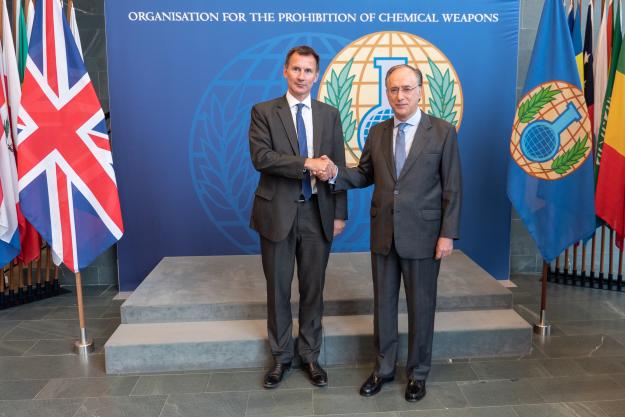
OPCW Director-General, Ambassador Fernando Arias, with Secretary of State for Foreign and Commonwealth Affairs of the United Kingdom, Rt Hon Jeremy Hunt MP
THE HAGUE, Netherlands — 16 August 2018 — Secretary of State for Foreign and Commonwealth Affairs of the United Kingdom of Great Britain and Northern Ireland, Rt Hon Jeremy Hunt MP, met today with the Director-General of the Organisation for the Prohibition of Chemical Weapons (OPCW), Ambassador Fernando Arias, at OPCW Headquarters in The Hague.
The Director-General briefed the Foreign Secretary on the progress of the implementation of the Chemical Weapons Convention (CWC), OPCW’s continuing activities in Syria, as well as efforts to enhance OPCW’s capabilities of addressing the threat from chemical weapons use.
The discussions also focused on OPCW’s technical assistance requested by the UK authorities following the incidents in Salisbury and Amesbury earlier this year.
The Director-General thanked the UK for its steadfast and longstanding support to the Organisation. “Today, we have reaffirmed our commitment to work together for the advancement of the international norm against chemical weapons,” stressed Ambassador Arias.
Foreign Secretary Jeremy Hunt expressed: “When the international community came together through the OPCW Conference of the State Parties in June to strengthen the ban on chemical weapons, they were showing that such weapons have no place in the world today. Reaching agreement on a new attribution mechanism for chemical weapons use in Syria was a huge step forward. Director General Arias and I discussed how we can make further progress in this area.”
“We are also enormously grateful to the OPCW for their assistance in helping to independently confirm the identity of the nerve agent used in Salisbury and now again in Amesbury, and for their ongoing work to shine a light on the appalling violations of international law in Syria.”
Background
The United Kingdom of Great Britain and Northern Ireland joined the Chemical Weapons Convention in 1997.
As the implementing body for the Chemical Weapons Convention, the OPCW, with its 193 Member States, oversees the global endeavour to permanently eliminate chemical weapons. Since the Convention’s entry into force in 1997, it is the most successful disarmament treaty eliminating an entire class of weapons of mass destruction.
Over 96% of all chemical weapon stockpiles declared by possessor States have been destroyed under OPCW verification. For its extensive efforts in eliminating chemical weapons, the OPCW received the 2013 Nobel Peace Prize.
